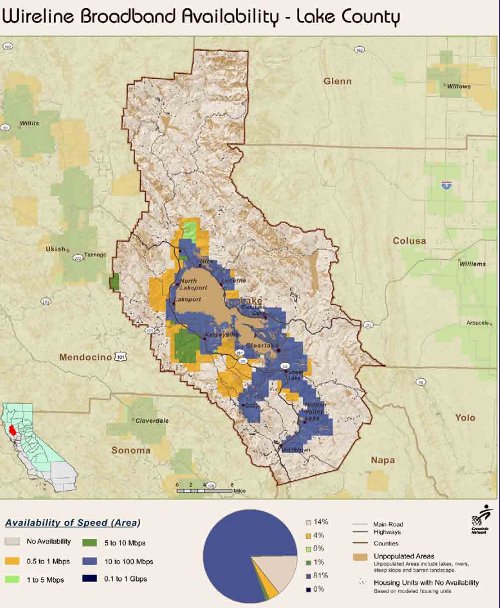
LAKEPORT – Local residents, businesses and officials gathered Friday afternoon to hear an update on the effort to map broadband access across Lake County.
The county of Lake hosted the afternoon meeting at the courthouse in Lakeport, where members of California State University, Chico's Center for Economic Development (CED) explained the Upstate California Connect regional broadband demand aggregation project.
“Upstate California Connect” is a group of five counties – Lake, Colusa, Glenn, Sutter and Yuba – that partnered with CED last year to propose a work plan to the California Emerging Technology Fund (CETF), a nonprofit organization established by the California Public Utilities Commission to improve access to broadband in underserved communities across California.
In late 2007, a group of North Coast counties received a CETF grant to expand broadband in rural areas, but Lake County wasn't included in that effort, as Lake County News has reported.
So County Administrator Kelly Cox approached Sunne McPeak, CETF's chief executive officer, to see if Lake County could be included. Instead, McPeak suggested Lake County become the lead agency in a new study. CETF gave the county $10,000 to cover preparing the grant application.
On Friday, CED officials Margaret Schmidt and Don Krysakowski explained the methodology behind the survey that will be used to gather input across the five-county region. Lake's meeting is the last of the public meetings CED has held on the survey, which is being conducted by phone.
Representatives of education, health care, small business and the Office of Emergency Services were among those present, all of them explaining the importance of broadband for everything from curriculum to expanding local business opportunities, including clean industry and telecommuting.
Krysakowski said the CETF provided initial funding for CED to conduct an initial feasibility study of broadband demand in 12 Northern California counties between July and September of 2008. That information ultimately will be used for a larger study effort. He said CED originally was tasked to do a demand survey.
This survey, expected to go out to 1,500 people across the five-county area, will be conducted in May, with results expected at the end of June, said Krysakowski. It will look at broadband's footprint in Lake and its partner counties. In three months CED hopes to return and update the community on the survey's findings.
Krysakowski noted that satellite Internet service does not count as broadband in the survey, due to speed issues.
Ultimately, the broadband demand information the survey is supposed to measure will be collected and put into a Web site so it can be queried, and will allow Internet service providers (ISPs) to use the information to make business decisions.
Krysakowski said the American Recovery and Reinvestment Act (ARRA) – or the stimulus bill – has $7.5 billion to expand broadband infrastructure in rural areas. He said ARRA funding will go to shovel-ready broadband projects, but the guidelines are still being written.
The ARRA also includes $350 million for broadband mapping. Krysakowski said CEFT and the California Public Utilities Commission are the bodies responsible for overseeing those funds.
Several individuals who attended the meeting wanted to know if the survey would result in more information about who provides what services. CED officials provided contradicting information to that question: One stated that the survey results would show the services but Schmidt said it was proprietary information.
She added, “The scope for this project is small.”
Cox told the group that he feels the project is important for economic development purposes, as well as helping preserve the environment.
“I look at this as one phase of the project,” Cox said.
Krysakowski told Lake County News that the definitions of shovel-ready broadband projects aren't yet clear, but they could lead to public, private or public-private partnerships to carry out infrastructure projects that expand broadband penetration.
The stimulus money is meant to help connect rural communities. He said a business model is being examined that was used during the 1930s to help bring electricity to rural areas.
In that instance, rural cooperatives were formed to support the nation's electrification goals in the 1930s and 1940s.
The ARRA funds won't result in full broadband buildout, Krysakowski said. “This is not a panacea.”
E-mail Elizabeth Larson at This email address is being protected from spambots. You need JavaScript enabled to view it..

 How to resolve AdBlock issue?
How to resolve AdBlock issue? 





